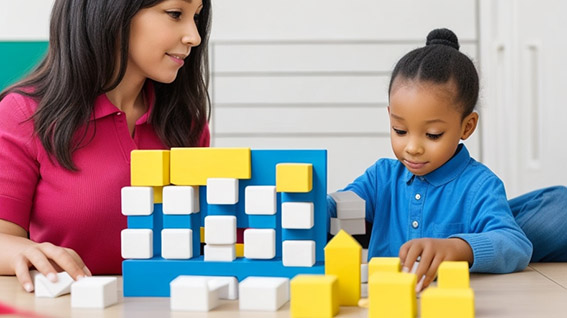
Arithmetic and English are the skills essential for a child's development. As kids learn mathematics, they develop crucial skills like logical reasoning and time management that are needed in any profession as well as the fundamental arithmetic abilities for performing day-to-day tasks. As there are over 617 million English speakers worldwide, learning the language helps children develop strong communication skills and increases their self-confidence. Besides, learning a language has a positive effect on children by boosting their curiosity, memory, cultural sensitivity, ability to multitask, and self-awareness.
The Wonders of Play-based Learning
There are five types of play: rule-based games, active play, social play, constructive play, and imaginative play. They all can be used in the learning process and may be suitable solutions to the question of how to make learning fun for kids. Thus, play-based learning is a crucial tool for fostering active learning.
The famous quote "Seeing is believing" certainly holds true when it comes to children's learning as they acquire knowledge by experience. Since play-based learning involves interaction with others, children are able to learn about their natural environment and build social skills.
Methods to Make Learning through Play Engaging for Children
Children are naturally curious explorers who are constantly trying to understand how things function in the world. This innate trait can be used in the classroom by introducing learning through activities that allow students to explore their surroundings, communicate their ideas, and think critically.
Ready to properly teach your youngster Math and English? Here are a few tips to help you on your journey:
1. Make a performance out of the story
Creating an engaging performance out of a common narrative during English lessons is a terrific approach to ensure fun English learning for kids since such acitivity captures their interest, fosters the development of their creativity and imagination, and helps with knowledge assimilation and retention.
2. Act out dialogues
Dialogue encourages kids to concentrate on effective language use while providing examples they can follow to improve their interactions. Children who act out dialogues gain communication skills, language proficiency, and a sense of teamwork.
3. Use games
Learning through games can be achieved in several ways:
- Games that involve physical activities
- Board games and flash cards
- Online games offered by teaching resources for mathematics
Physical games are a great way to keep children mentally stimulated while sneaking in a few lessons on the sly. Games that require physical activity, such as a math treasure hunt, can improve interpersonal skills because they promote interaction between a child and a tutor or between a child and other children. Additionally, physical games like Math Hopscotch help ensure fun math learning for kids as well as boosts motor coordination skills in children.
Board games like Monopoly and Math Bingo are fantastic tools for knowledge retention because they provide opportunities for children to apply concepts previously learned. Board games involve logical thinking and problem-solving skills, which children develop as they play board games frequently.
Conclusion
Early childhood development is not complete without game-based learning. Integrating games and play-based learning activities can help boost children's physical, social, cognitive, and emotional development. More importantly, they develop vital life skills while playing. If you needed a sign to switch up your child's education and make things more fun, this is it!













